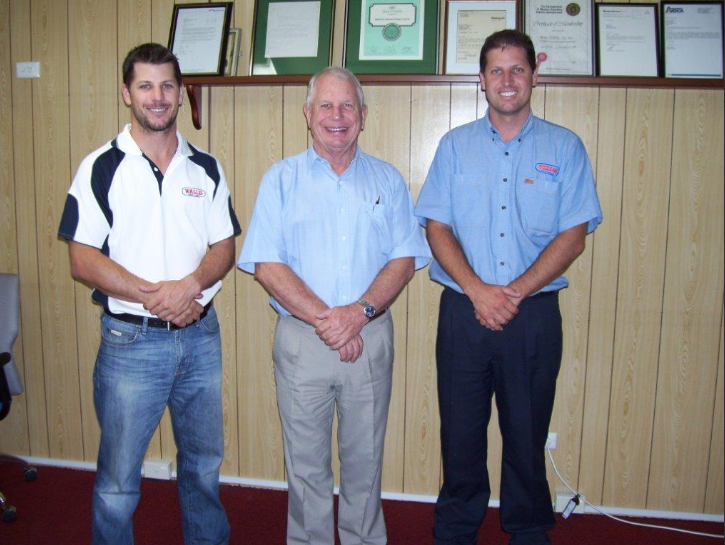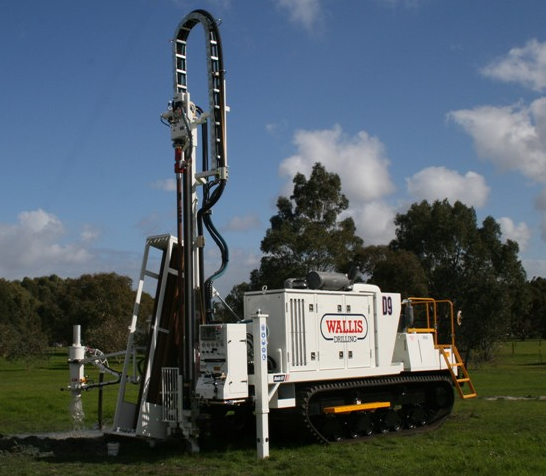Drilling down into the Wallis family business
It's tough out there in some parts of Australia's mining sector, but Graeme Wallis isn't that concerned.
After all, he's seen plenty of mining booms and busts over the past 50 or so years, and over that time his family-owned drilling rigs contracting business, based in Midvale on the outskirts of Perth, has gone from strength to strength.
“The mining industry certainly isn't finished,” says Graeme. “It's only exploration that has slowed down.”
Started by his father Marty and his brother Jamie in 1964, Wallis Drilling (originally Wallis Geotechnical Drilling) began life in the Rum Jungle uranium precinct south of Darwin under contract from the Bureau of Mineral Resources.
After cutting their teeth in the Northern Territory, the Wallis duo moved further south as the nickel boom in the 1960s took hold, and Graeme made it three when he decided to come on board in 1969 after a stint working in Papua New Guinea.

Graeme Wallis with his sons Kim (left), who is in charge of drilling exploration and Grant (right), who heads up the offshore division.
But Graeme didn't stay around for long, and he soon left the family business to work in Perth's finance sector. Yet Wallis Drilling continued to expand without him, driven by a series of major innovations in drilling processes by the company. This included a new reverse circulation drilling system patented by Marty (enabling drilling below water tables in soft sediments) and the invention of the world's first aircore drilling system (which uses compressed air to retrieve mineral samples) by Jamie in the 1970s.
The company's rapid growth and success was enough to entice Graeme back into the family business fold in 1976, and he effectively took over the running of the company as managing director while Marty and Jamie concentrated on being drillers and technical specialists. The Wallis Aircore system ultimately won an Australian Design Award, and has now become the standard for drilling by the mineral sands industry worldwide.
The system was also instrumental in the discovery of diamonds by Rio Tinto at Ellendale in Western Australia's Kimberley region, which earned Wallis Drilling a contract at the current Argyle Diamond Mine.
During the 1980s, Wallis Drilling expanded its drilling rigs fleet to include reverse circulation, aircore and diamond core drill rigs. By 1989, the company was operating 22 drill rigs throughout Australia as well as undertaking drilling operations in Africa, the Americas and many places in South-East Asia.
“It's an interesting business to be in. It's hands-on and I've been to places that tourists will never see,” says Graeme.
Further expansion occurred in the 1990s. Grade control and blast hole rigs were added to the fleet, as well as specialised equipment, including lake drill rigs, helicopter-transportable drill rigs and custom-built rigs, to suit specific environments. Wallis Drilling has maintained a steady rate of growth, and it now has a fleet of more than 50 drill rigs. With big drilling rigs costing upwards of $3.5 million each, the company's working assets are sizeable. Drill rig management and maintenance has also become a key part of the company's operations, enabling it to maintain long-term contracts with major mining companies.
Wallis Drilling now has around 200 employees, and has successfully completed projects in more than 30 countries outside of Australia.
Over time, the business has secured about 80 per cent of the Australian drilling market and last year the company was a technology finalist in the EY annual Entrepreneur of the Year awards. And business is good. “One things as a private company is that you can run with low profits,” says Graeme. “And we are making good profits; we have not had a loss for the past 30 years.”
Recently, Wallis Drilling entered the third generation of family business operations, with Graeme's oldest son Grant (38) now looking after the offshore division as drilling manager international, while his second son Kim (33) is drilling manager exploration.
“Our family business constitution dictates that members must work for at least two to three years in other companies, and both of my sons have worked outside of the business in different roles,” Graeme says.

At age 71, Graeme says he is now looking at “pulling back” from the business. About five years ago he appointed a family outsider, former ANZ Bank senior executive, Mark Crumby, as the company's chief executive officer.
“I didn't need a driller to run the company,” he says. “I needed someone who knows how to run a business.”
Now, Graeme says he's in the process of creating a full board of directors.
“My brother (Jamie) will be on the board, I will be the chairman, there'll be the CEO, and my two sons will be alternates. It's important that we have external controls to keep the company on track.
“I am trying to future-proof it as far as management is concerned. But we don't want to go public -- there are too many headaches.”















